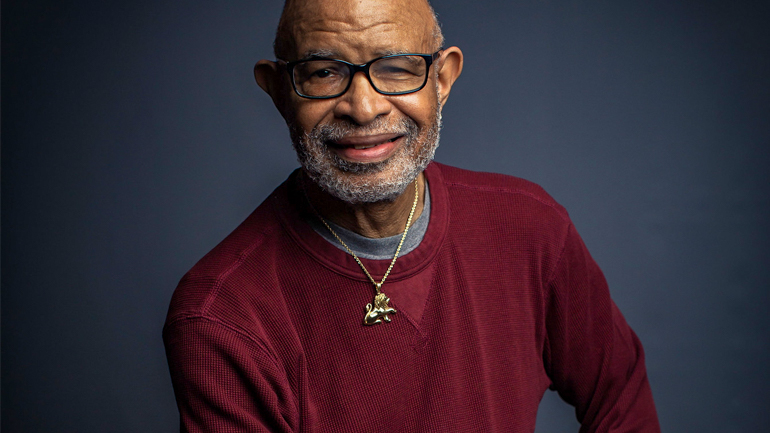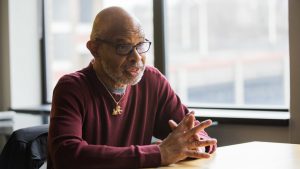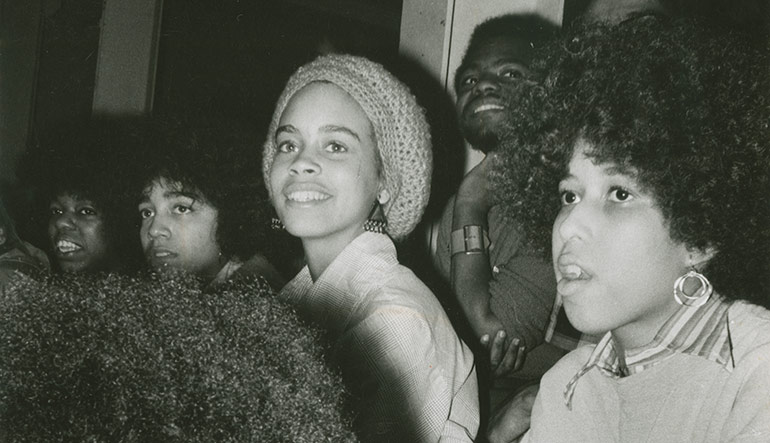The Change Maker

Lawrence Lennon ’71
By Bryan Hay
One of Larry Lennon’s most vivid memories from his early days as a Lafayette first-year student was seeing white students sunning themselves on the Quad.
It was 1967, a tumultuous year that saw increasing numbers of people at peace rallies protesting the Vietnam War while rioting disrupted cities throughout the nation. In spring semester of that academic year, the Rev. Dr. Martin Luther King Jr. was murdered.
“There was a lot of volatility at the time. It was the end of the 1960s,” recalls Lennon ’71, who came to Lafayette from Jamaica, Queens. “There was a whole lot going on in the ’60s in terms of civil rights and the Vietnam War, and I was coming to college as a freshman with a country facing summer riots.”
Tensions were palpable everywhere, but Lennon says he and the other 23 black men on campus never sensed a feeling of overt racial hatred or unease at Lafayette.
“We looked at the situation from where we were coming from, some from the South, some from urban areas,” he says. “And for most, it was just a culture shock in terms of coming into the campus and being part of a white culture. It just wasn’t our scene.”
There was not much to do outside of fraternity life on an all-male campus.
“We just started to get together more,” Lennon says. “One of the first things we started to notice as a group was that there wasn’t a whole lot of interplay among the black students. That really surprised those of us who came here that with being such a small population, there wasn’t more going on.”
Lennon and the other black students made the most of it, eventually meeting students at the all-women Cedar Crest College in Allentown and connecting with the Easton community.
Before long, the students resolved to formalize their campus community “because we had no other outlet,” he says. “We sought not just unity but community. We said, ‘Let’s address our ideas and our wants.’”
When Lennon returned for his sophomore year, he and other black students approached student government to become a student organization and created bylaws for the new Association of Black Collegians (ABC) during the 1968-69 academic year.
In 1969 during a forum in Colton Chapel, ABC presented a list of demands, including admitting more black students, ending racial attitudes on campus, creating more courses devoted to black studies, and adding more black faculty and administrators.
Their demands, which also were presented to Roald Bergethon, president of the College at the time, had a mixed reception, “although most students felt it was positive in terms of the way we presented them,” Lennon says.
Four demands didn’t seem like the right number, Lennon remembers, so the students took a leap of faith and requested a campus house for black students.
“Sure enough, after the proposal was delivered, the Black House was the first thing they gave us,” he says. “We didn’t expect it.”

The Black House was originally on a corner of the Quad next to Hogg Hall. It was razed to make way for Farinon College Center and moved to its current location at 101 McCartney St.
“It was probably the most influential and beneficial thing that we got out of our list of demands,” Lennon says. “It was more than a house, it was a home. It was ours. We could have our parties there, our kind of parties, with dancing and music.”
When Lafayette became a co-ed campus in fall 1970, ABC also became a welcoming place for black women.

Darlyne Bailey ’74 was one of nine black women among 2,000 students in fall 1970. She was born in Harlem and raised in Englewood, N.J., one of the first communities in the nation to desegregate its schools. She joined ABC immediately.
“All of us were in shell shock. We’d never been to a place with so few women and people of color,” recalls Bailey, professor, dean emeritus of the Graduate School of Social Work and Social Research, and special assistant to the president for community partnerships at Bryn Mawr College. “But the brothers at ABC reached out with open arms and hearts and made all of us feel very welcome and comfortable. It was an easy place to walk into.”
In the early 1970s, Easton was a microcosm of everything that was happening in the country. Bailey remembers joining a protest at Easton Area High School to lend support and mediation to young black students “and bring peace,” only to have a police dog jump on her chest. On campus, she would receive occasional remarks laced with racist overtones from male students.
But after sorting through those difficult recollections, she can return to loving memories of the nurturing support of David A. Portlock, an African American administrator and associate dean of academics at Lafayette, and other administrators who helped advocate for ABC and establish the Black House.
“I remember him so vividly; he took time to talk to us as students of color,” she says. “It was just incredible. He was a father to us all. Because of Dean Portlock, we felt very protected and supported to think boldly. I was, and remain, a proud Pard.”
Bailey and Lennon agree that the College administration and Board of Trustees acted in a very forward-thinking manner by backing ABC at a very pivotal moment in the College’s history.
“The trustees always acted in good faith and wanted to move the College forward,” Lennon says. “I’m proud to be a Lafayette graduate.”
Lafayette College recognized the founding members of ABC and commemorated the organization’s 50th anniversary at the McDonogh Network Spring Celebration on April 14.
A statement from ABC President Kumbaya Okorie ’20
The Association of Black Collegians has been the pillar and representing body of black students on the Lafayette campus. It also has been one of the main promoters and supporters of social change both on and off campus since its founding. The culture within the organization is such that we have made it our mission to support, uplift, and empower all students of color, specifically black students. On a campus and in a country where a majority of our members are members of a minority group and deal with pressures related to these relationships, we have made it our mission to make life just that little bit easier and just that much better for our members.
Among our many goals is our desire to foster the growth of a community that is interested in development and in understanding and experiencing the culture of black people as well as their struggles and triumphs. We seek to be the bridge that brings the students of color whom we represent into contact with the rest of the Lafayette community with the goal of fostering a harmonious community dedicated to cultural and intellectual growth.